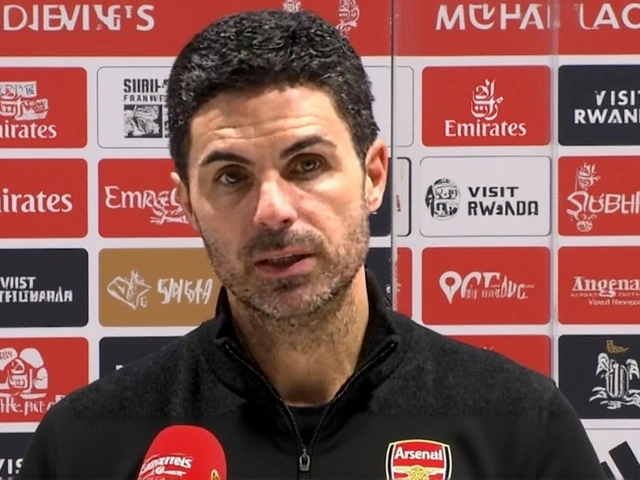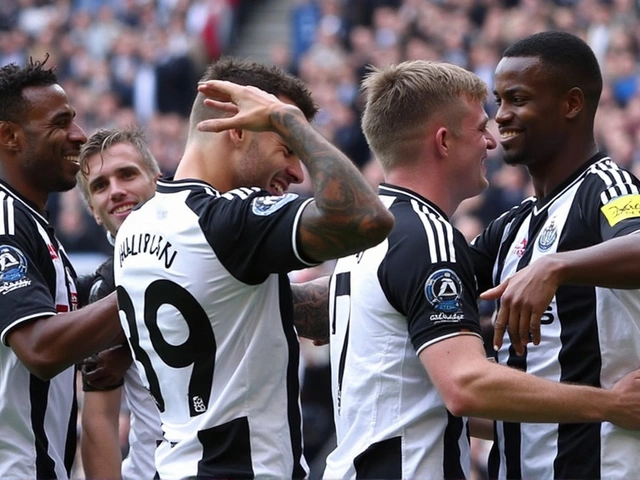Sky's Fixture Change Stirs Controversy Among Fans
In a move that's sending shockwaves through the football community, Sky Sports has officially announced a change in the fixture schedule for Newcastle United. This decision has not gone down well with the supporters of other Premier League clubs, particularly Aston Villa and West Ham United. The rescheduling of the match is seen as yet another example of how television broadcast considerations are dictating the landscape of English football, often to the detriment of the fans.
Impact on Newcastle United Supporters
Newcastle United fans have had a season filled with ups and downs, and this latest development adds another layer of complexity. The team has been making headlines, not just for their on-field performances, but also for off-field changes. Matt Targett's recent move from Aston Villa to Newcastle has already created a buzz. Adding to that, the Magpies have achieved significant victories against both Aston Villa and West Ham in January and March 2024. These key wins have elevated the team’s standing and ignited hopes of a strong finish to the season.
Backlash from Aston Villa and West Ham Fans
However, it's the timing and manner of this fixture change that have riled up the fans of Aston Villa and West Ham. Both sets of supporters feel that their interests are being sidelined in favor of television ratings. For Aston Villa supporters, the loss of Matt Targett to Newcastle was already a bitter pill to swallow. Now, with the added inconvenience of rescheduled matches, their frustration is reaching a boiling point. Similarly, West Ham fans, who have seen their team struggle against Newcastle recently, are upset over the perceived favoritism shown towards the Magpies.
A Growing Trend in Premier League
This incident is not an isolated one. There has been a noticeable trend in the Premier League where match schedules are frequently altered to accommodate broadcast requirements. The influence of television money on the sport is undeniable, but it often comes at a cost to the loyal fanbase. Many supporters feel that their voices are being drowned out by the clamor for higher TV viewership and the associated revenue. With matches being moved to inconvenient times, fans are left grappling with travel issues, rearranging personal commitments, and in some cases, even missing out on attending games they had long planned for.
Financial Implications for Clubs
While the monetary benefits for clubs are evident, this reliance on TV deals has its downsides. Smaller clubs, like Aston Villa and West Ham, often find themselves at a disadvantage, as they don't attract the same level of broadcast interest as the bigger names. This means their matches are more likely to be rescheduled or given unfavorable slots, further alienating their supporter base. Newcastle, on the other hand, has seen an uptick in their media presence, largely due to their recent performances and strategic signings.
Football Fans' Perspective
From a fan's perspective, this trend of rescheduling matches by broadcasters is deeply concerning. Football is more than just a sport; it is a tradition, a source of community spirit, and for many, a family affair. Fans plan their entire week around match days, and sudden changes can disrupt not only their plans but also their emotional connection to the club. The feeling of being an afterthought in the grand scheme of commercial interests is disheartening to many die-hard supporters.
Moving Forward: Seeking a Balance
As the debate rages on, the question remains: how can a balance be achieved between the needs of broadcasters, clubs, and fans? It is clear that television deals bring invaluable revenue to the league, enabling clubs to invest in top talent and infrastructure. However, without the unwavering support of their fans, the very essence of football is at risk. Clubs and broadcasting companies need to be more transparent and considerate regarding scheduling changes. Proactive communication, advance notice, and genuine engagement with fan groups could go a long way in mitigating the negative effects of such changes.
A Call for Fans' Voices to Be Heard
In conclusion, while the rescheduling of the Newcastle United fixture by Sky Sports has caused a significant stir, it is part of a broader issue facing modern-day football. The voices of the fans must be heard, and their interests considered when making such decisions. Only by fostering a collaborative approach can the sport maintain its rich heritage and continue to thrive in the commercialized era of broadcasting. It's a delicate balance, but one that is necessary for the future of the game.





Comments
When we deconstruct the broadcast-driven fixture matrix, it becomes evident that the algorithmic prioritisation of primetime slots is marginalising clubs with less commercial gravitas. The data pipelines feeding the scheduling engine rely heavily on projected viewership metrics, which are themselves derived from historical audience segmentation and advertising ROI models. This creates a feedback loop where high‑profile clubs receive preferential exposure, while the peripheral fanbases bear the logistical externalities. As an inclusive mentor, I’d suggest that the governing bodies incorporate a weighted fairness coefficient that accounts for fan travel burdens and regional attendance patterns. By integrating these variables, the system could achieve a more equitable distribution of broadcast slots without compromising revenue streams.
One must contemplate the ontological ramifications of treating football as a mere commodity, for the sport is an archetype of collective identity that transcends the binary of profit and pastime. When a fixture is shifted to appease the whims of a multinational broadcaster, the implicit hierarchy reverberates through the very fabric of local community rituals, where matchday pilgrimage is sacrosanct. The fans of Aston Villa and West Ham, whose histories are steeped in industrial perseverance, experience an erosion of agency when their temporal autonomy is compromised. In this paradigm, the stadium becomes a set piece for a televised narrative, rather than a locus of lived experience. By invoking the philosophical principle of reciprocity, we recognise that the audience's devotion ought to be reciprocated with respect for their temporal investment. Moreover, the logistical dissonance imposed by last‑minute rescheduling exacerbates socioeconomic disparities, as working‑class supporters grapple with transport costs and occupational constraints. An inclusive mentor must therefore advocate for a transparent scheduling framework that foregrounds stakeholder consultation. The current opacity fuels cynicism, breeding a sentiment that the league's custodians are detached from the grassroots pulse. If we analyse the temporal elasticity of fixtures through a lens of relational ethics, we uncover a latent potential for policy reform that harmonises commercial imperatives with fan welfare. Additionally, the recent transfer of Matt Targett serves as an illustrative microcosm of how player movements intertwine with broadcast narratives, further complicating the authenticity of competition. The magpie’s ascent, while celebrated on pitch, is simultaneously co‑opted into a media spectacle that marginalises rival clubs' supporters. This duality underscores the necessity for a balanced discourse that does not merely echo the broadcasters' agenda. It is incumbent upon league administrators to institute a deliberative mechanism whereby fan councils can voice concerns prior to any schedule alteration. Such a mechanism would operationalise democratic principles within the sport's governance. Ultimately, embracing a symbiotic relationship between media entities and the fanbase-rather than a parasitic one-can preserve the sport’s cultural heritage while sustaining its economic vitality. In summation, the recalibration of fixture scheduling must be guided by both quantitative analytics and qualitative humanist insights to achieve a just equilibrium.
Sky's schedule shuffle is just another cash grab.
Yeah the money talk is real cuz clubs need it but fans get the short end of the stick
Honestly I get why clubs love the TV money 😅 but it’s rough on people who plan their work and travel around match days.
Here’s a quick tip: start a petition on Change.org and tag Sky Sports and the Premier League. The more signatures you gather, the harder it is for them to ignore the fanbase.
The reality is that the league has always been a business first, and fans who complain are overlooking the economics that keep the clubs afloat.
While you’re busy preaching the virtues of profit, you ignore the fact that the broadcast giants wield disproportionate influence over the sport’s narrative, turning clubs into mere content generators for their advertising pipelines. Your idealistic delusion that fans deserve priority is naïve at best; the cold hard truth is that revenue streams dictate scheduling decisions, and anyone clinging to tradition is living in a bygone era. Moreover, the logistical nightmare inflicted upon supporters of clubs like Aston Villa and West Ham is a calculated externality, a sacrifice willingly made on the altar of higher viewership numbers. If you actually read the financial reports, you’ll see that the incremental gains from prime‑time slots outweigh the marginal inconvenience caused to a few thousand fans. So spare us the moral high ground and accept that football, as it stands, is a commercial enterprise that will always favour the pockets that fund it.
We cant let the broadcasters dicrease our match day vibes, let's keep cheering alll the way!
It is essential that the clubs engage in constructive dialogue with broadcasters to find a mutually beneficial solution
Oh great, another schedule tweak-because what fans really need is more surprise pop‑ups in their calendars, right?
Sure why not
One must acknowledge that the hegemonic media apparatus perpetuates a quasi‑feudal hierarchy, wherein the plebeian spectators are relegated to the periphery of the televisual spectacle.
Alas, dear compatriots, the hallowed grounds of football are now but a stage for broadcasting overlords, and we, the humble devotees, are forced to bow to their capricious whims.
I think a balanced approach that respects both the financial realities and the fans’ genuine passion would serve everyone better.
While many proclaim the schedule changes as a betrayal, one could argue that flexibility actually benefits clubs by providing broader exposure across different time zones.
Let’s stay hopeful that the league will listen to our concerns and maybe, just maybe, find a compromise that doesn’t leave us all feeling ignored.
Indeed, the current predicament, with its myriad implications, demands an immediate, comprehensive review; the stakeholders, ranging from club executives, to broadcasting conglomerates, to the ardent supporters, must convene, deliberate, and enact reforms; otherwise, the very fabric of our beloved sport may irrevocably unravel, and that, dear colleagues, would be an unspeakable tragedy!